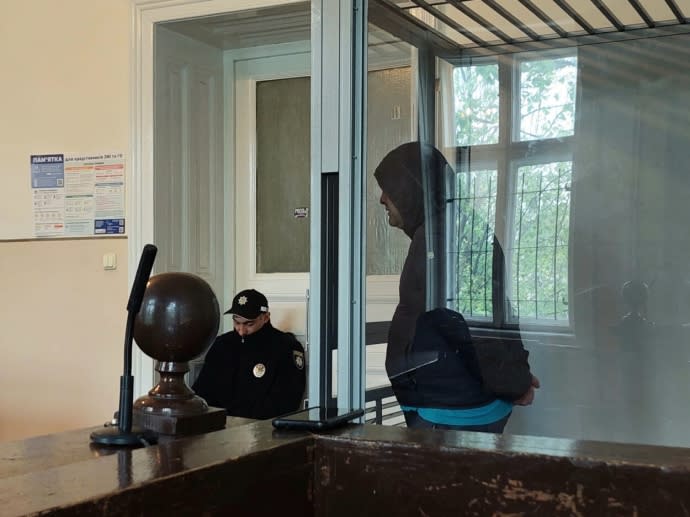Man sentenced to life imprisonment for giving Russians information about Ukrainian positions in Lviv Oblast
The court found Vladyslav Kozieiev, 47, who shared photos of military facilities in Lviv Oblast with Russian forces, guilty of high treason.
Source: Court Reporter, a publication covering court proceedings in Ukraine
Details: On 16 May, a panel of judges of the Zaliznychnyi District Court in Lviv sentenced Kozieiev to life imprisonment; his property will be confiscated.
Prosecutor Taras Kovalchuk proposed the harshest form of punishment, given that the defendant not only carried out tasks he received from his Russian handlers, but also, for ideological reasons, independently sought out information [that might be useful for the Russians] and passed it on to the Russians.
Kozieiev pleaded not guilty, saying that he did not commit the acts set out in the indictment.

Kozieiev is a Ukrainian citizen, but was born in Ulan-Ude, the capital of Buryatia, a republic in eastern Siberia that is part of the Russian Federation. In 2008–2010, he was given a suspended sentence for fraud, for misappropriating 3,600 hryvnias (approximately US$97). He deceived his friend, telling her that he was borrowing the money either to buy a land plot or to buy a sofa for his apartment, as he intended to have guests.
On 20 May 2022, he was detained in his parents’ house. He took photos for the Russians from the windows of the house, as it was near the railway tracks.
In May 2022, several months after the full-scale Russian invasion, Kozieiev shared information about the location of Ukrainian military facilities and Ukrainian Armed Forces units with representatives of the Russian Federation. He also passed on the coordinates of critical infrastructure facilities in Lviv Oblast, including those of five bridges. He used his phone to take photos and videos showing the outcomes of Russian missile attacks on Lviv. In total, he passed various types of information on to Russians a total of 25 times.
Kozieiev shared the information he obtained via Telegram, sending it to a user whose alias was "$". Covert investigative search operations established that this was Sergey Varin, a Russian citizen.
Only some of exchanges between Varin and Kozieiev were found on the phone seized from Kozieiev, since he was using the messenger’s auto-delete function.
Using a dedicated software, investigators were able to restore deleted images on Kozieiev’s phone, which he likely shared with the Russians. The photos capture the aftermath of a missile strike on Lviv, a military unit and military equipment in a village in Lviv Oblast, a Ukrainian Armed Forces training centre, an oil depot, and a bridge, among others.
The contents of his phone suggest that Kozieiev was fond of Communist and Russian symbols, and kept several photos marked with Z. He subscribed to several Russian Telegram channels [including several Kremlin-aligned propaganda channels]: Solovyev Live, Madurov, Radio Sputnik, Sladkov+, Margarita Simonyan, Kadyrov 95.
Kozieiev posted a question in the Solovyev Live Telegram channel, asking whether Russian forces would fight in Lviv.
He also expressed his concern about this in his correspondence with other users, including someone with the alias Sasha Bryansk.
Before the outbreak of the full-scale war in Ukraine, Kozieiev regularly travelled to Russia and worked there. He was an active user of several Russian apps: Sberbank, Wallet, Rosneft, Avto.ru.
Many Russian phone numbers are saved on his phone, including those of employees of the Ministries of Internal Affairs and Foreign Affairs, and the Migration Service. Residence permit application forms, downloaded from the website of the Moscow Migration Centre, were also found on his phone.
His phone also contained a photo of a letter from the Russian Interior Ministry dated 2021, indicating that Kozieiev wanted to obtain a Russian passport.
He also corresponded with the late Vladimir Zhirinovsky, right-wing populist leader of the Liberal Democratic Party of Russia, about his citizenship application.
During the trial, the defendant’s lawyer tried to convince the court that Kozieiev had likely ceased to be a citizen of Ukraine and therefore could not be tried for treason.
The court hearings lasted for over six months. Kozieiev refused to give his version of the events, saying that he had not had enough time to talk to his lawyer and agree on a position.
The court refused to adjourn, concluding that the defendant was refusing to testify. Defence counsel Rostyslav Dol then challenged the presiding judge, allegedly for her bias, but the challenge was not granted.
Kozieiev asked to be acquitted, and his lawyer claimed the persecutors pursued an incorrect charge against his client. He said he did not see any treason in Kozieiev’s actions – at most, unauthorised dissemination of information about the movement of the Armed Forces under martial law.
Journalists fight on their own frontline. Support Ukrainska Pravda or become our patron!

